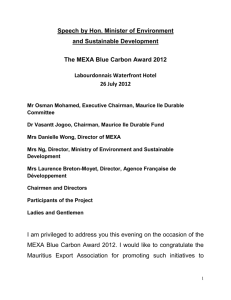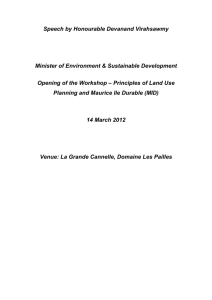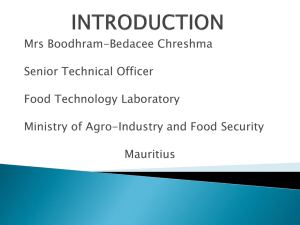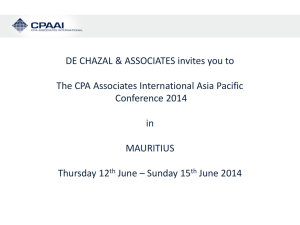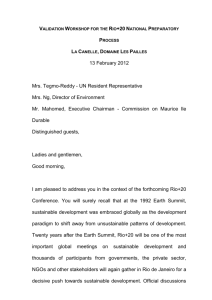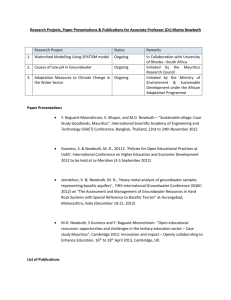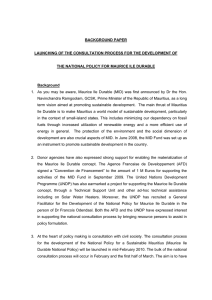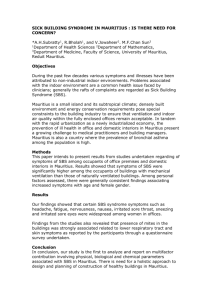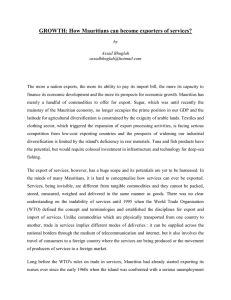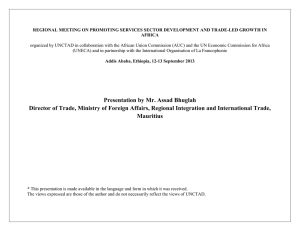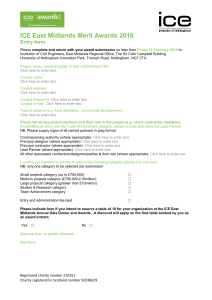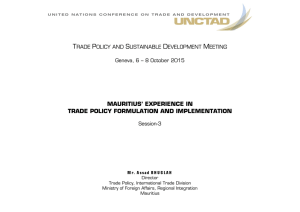Speech of - Ministry of Environment and Sustainable Development
advertisement
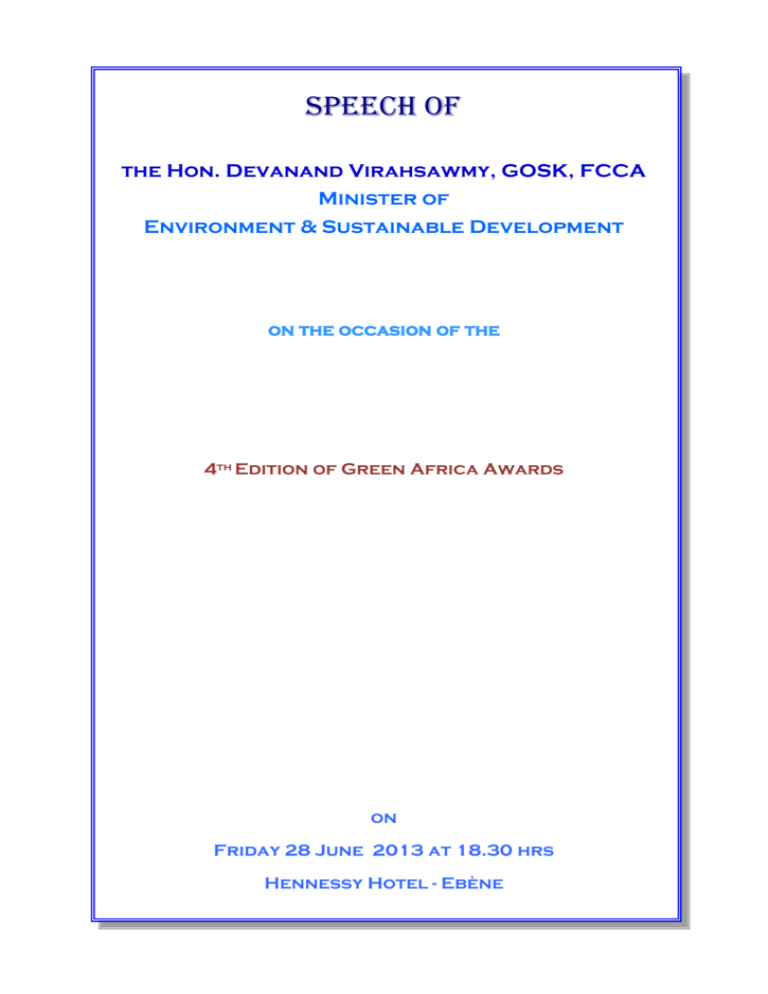
Speech of the Hon. Devanand Virahsawmy, GOSK, FCCA Minister of Environment & Sustainable Development on the occasion of the 4th Edition of Green Africa Awards on Friday 28 June 2013 at 18.30 hrs Hennessy Hotel - Ebène Hon. Suren Dayal, Minister of Social Integration Your Excellency Dr. Nokwe, High Commissioner of South Africa Mr. Vinesh Chintaram Director of ANPRAS I am pleased to be in your midst this evening for the 4th edition of the Green Africa Awards. I would like, at the very outset, to congratulate the ‘Association Civique de Midlands’ and the ‘African Network for Policy Research and Advocacy for Sustainability’ for their dedication and efforts to foster sustainable development through several community-based initiatives. ANPRAS and the ‘Association Civique de Midlands’ have come a long way, since the organisation of the 1st Green Africa Awards in 2010. Indeed, in addition to showing sustained leadership and advocacy on a number of yearround activities like Earth-Hour, Candle-Night and Earth Day, both organisations have been recognising environmental performance at sub-regional and regional levels since last year. I understand that Green Africa Awards were attributed to organisations involved in a number of projects aimed at promoting green innovation, natural resources protection and restoration, green growth and eco-tourism among others. For this year’s series of rewards, I note that the Millennium Development Goals have been used as spearhead to guide you in your endeavour. I also observe that you have innovated by revisiting and by considering new award categories in areas such as: Agriculture and Food Security; Social, Affordable and Sustainable Housing; 2 Renewable Energy and Rural Electrification Schemes; Sustainable Communities; Green Cities and Towns; Eco-buildings and Sustainable Land Use ; Green Business and Corporate Social Responsibility These themes are in line with the Millennium Development Goals which aim at achieving sustainable development, green growth and empowerment. I would like to seize this opportunity to mention some actions taken by Government to meet the Millennium Development Goals. It goes without saying that Government’s aspiration is to uplift the quality of life of the population. In fact, our economic development model has been built on the premise to maintain, enhance and expand the welfare state for each and every Mauritian. However, despite the global financial turmoil, the volatility of commodity prices on the international markets and morose economic growth at national level, Mauritius has managed to maintain free primary and secondary schooling, free health care, free bus transport to students and elderly citizens. Moreover, 58% of the national budget is spent on community and social services, of which 36% is paid as non-contributory Basic Retirement Pension to any citizen above 60. On the other hand, many people have invested in acquiring their homes and Mauritius boasts that the rate of home ownership peaks at 86% which is one of the highest in the world. It is therefore no wonder that Mauritius has achieved or nearly achieved many of the fundamental Millennium Development Goals. I will just mention a few examples: 3 The Net Enrolment Rate in primary education is 97%. The literacy rate of those aged between 15 and 24 years is 95.4%. All households are provided with safe drinking water, 99.9% have an improved sanitary facility. 100% of its population have access to free essential medical drugs. In fact, the Mauritian citizens have free medical treatment (including high tech medicine such as open heart surgery or eye laser treatment). 93% of women have, free of charge, at least one antenatal medical care treatment and 83% have at least four visits. 99.4% of births are attended by skilled health personnel. Vector borne diseases such as malaria have been eradicated with only a few cases arising from imported infection. 100% of HIV and AIDS known sufferers have free antiretroviral drugs. However, we may not be faring to the expected level as regards Millenium Development Goal No 7 which is about Environmental Sustainability. In spite of Government’s sustained effort, the usual downside accompanying the need for development is obvious. We acknowledge that the percentage of land area covered by forest has gone down from 30.6% in 1990 to 25.3% to-date. Carbon dioxide emission has increased two-fold. However, the bright spot is the fact that Government has managed to bring consumption of ozone depleting substances to zero through a range of actions. Ladies and Gentlemen, As you are aware, sustainable development is a top priority on Government’s agenda. You will recall that in 2008, the Prime Minister envisioned Maurice Ile Durable as the new long term development goal to enable our country to progress towards sustainable development. In fact, since 2008, Government has 4 tried to rebalance growth, consolidate social justice and more towards green economy. Several concrete measures have been taken since then to translate this vision into concrete actions. I will just mention a few: We have developed a national framework for sustainable consumption production to promote a culture of sustainable consumption and production in the country - this is the fundamental towards achieving Sustainable Development. We have adopted a mix of economic instruments to encourage sustainable practices. Some tangible examples are the Rs 10,000 grant to purchase solar water heaters, incentives to Small Independent Power Producers to sell energy generated from renewable sources to the national grid and the adoption of energy efficiency and energy conservation measures across a range of sectors. We are also encouraging resource efficiency and clean technology in Industries. Along this line, we have supported industries wishing to calculate their carbon footprint and thereby taking appropriate corrective measures. While strong political resolve and leadership are essential to gear sustainable development, it is also crucial to have proper policies, strategies and action plans. In this context, I am pleased to announce that the Maurice Ile Durable Policy, Strategy and Action Plan have been adopted by Cabinet on 14 June 2013. As a societal project, Maurice Ile Durable aspires to deliver sustainable growth and to make Mauritius a model of sustainable development. The MID Policy, Strategy and Action Plan comprise four Priority Programmes, namely: Energy Conservation and Renewable Energy, Cleaner, Greener and Pollution Free Mauritius, Green Economy and Ocean Economy. Some 130 5 projects/activities have also been proposed across the 5 development pillars (commonly known as 5 Es, i.e., Energy, Environment, Employment, Education and Equity). The recommendations contained therein will be implemented in the short, medium and long terms in order to bring coherence in our country’s development and enhance existing activities by introducing new ideas for moving confidently towards sustainable development. You will concur with me that progress towards sustainable development must be supported by all stakeholders and that every step taken towards sustainable development is of value. I therefore appeal to you and to all NGO’s for your full collaboration and support to Government to translate the MID vision into concrete action. Before ending, I would like, once again, to thank the ‘Association Civique de Midlands’ and ANPRAS for giving me the opportunity to address you this evening. I would also like to seize this opportunity to congratulate the winners of the Green Awards Mauritius 2013 edition. I thank you for your attention. 6
